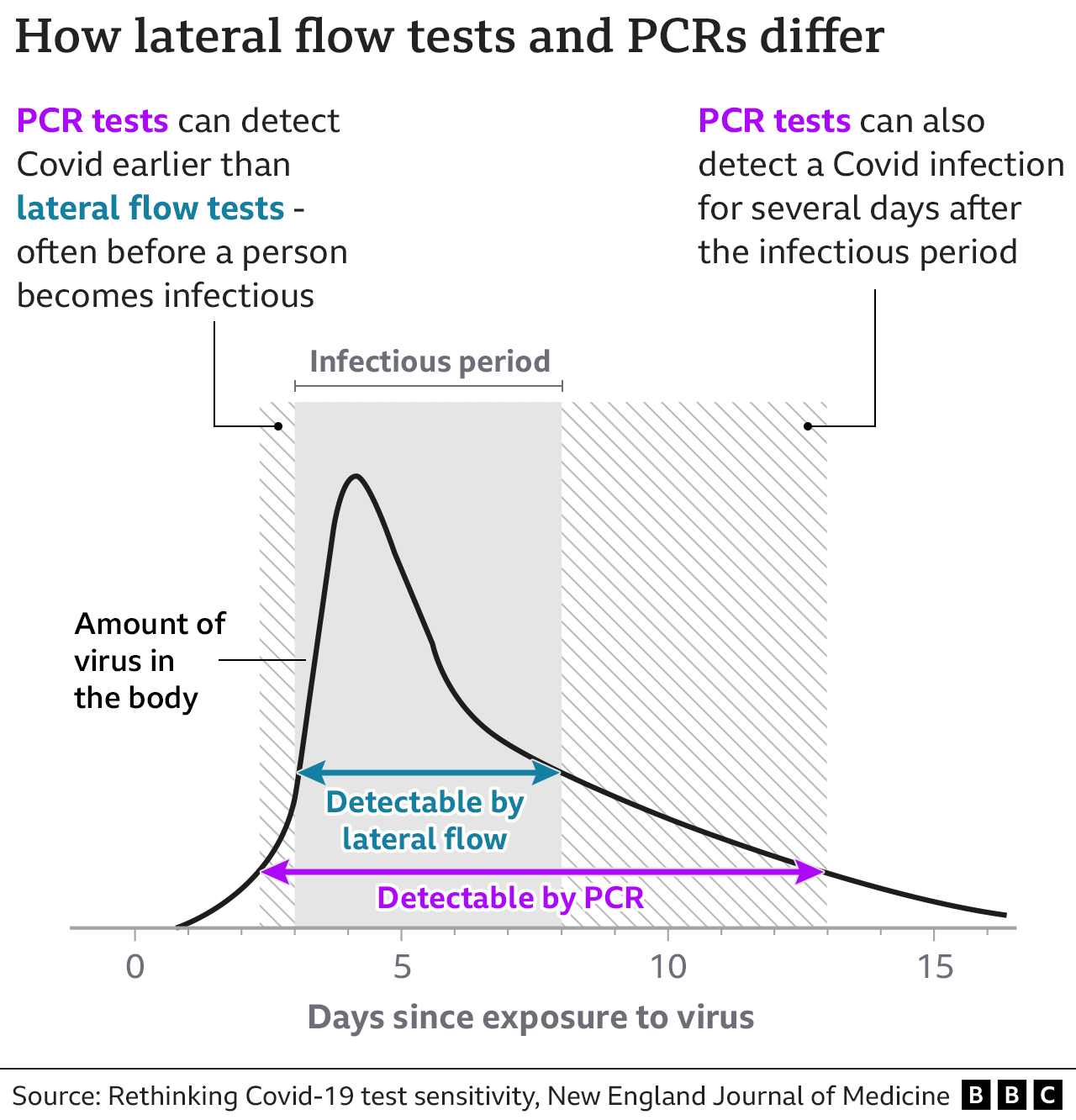
Covid testing rules are to be eased for people without symptoms, who will no longer need to confirm a positive lateral flow test with a PCR.
The UK Health Security Agency said the change will come in from 11 January in England.
While Covid levels are high, people can be confident that rapid tests are highly accurate, it added.
The change will be reviewed when the proportion of people with the virus in England drops below 1%.
Around 4% of people are currently infected with coronavirus, according to the Office for National Statistics.
Under the new guidance, anyone in England who receives a positive lateral flow device (LFD) test result should report their result on gov.uk and must self-isolate immediately, but will not need to take a follow-up PCR test.
After reporting a positive LFD test result, they will be contacted by NHS Test and Trace so that their contacts can be traced.
Anyone who tests positive will be able to leave self-isolation seven days after the date of their initial positive test if they receive two negative lateral flow test results, 24 hours apart, on days six and seven.
At present anyone with a positive lateral flow test who has no symptoms needs a PCR test – carried out in a lab – to confirm their result. This can take days to arrive and health officials are worried people may not be isolating during this time.
Dr Jenny Harries, chief executive of UKHSA, said: “While cases of Covid continue to rise, this tried-and-tested approach means that LFDs can be used confidently to indicate Covid-19 infection without the need for PCR confirmation.
She added: “I’m really grateful to the public and all of our critical workers who continue to test regularly and self-isolate when necessary, along with other practical and important public health behaviours, as this is the most effective way of stopping the spread of the virus and keeping our friends, families and communities safe.”


Lateral flow tests are very good at detecting people who are infectious at present because the prevalence of the virus is high and there are lots of cases to be spotted.
Analysis shows that if you tested 1,000 people right now, you’d get 41 testing positive and almost all of them would be correct – but last summer, when there were fewer cases around – you’d get three positives but only two would be true. That’s when a PCR would be important to confirm the result.
The latest Covid figures showed 218,724 new cases were recorded in the UK on Tuesday. That number included previously unreported cases from Wales and Northern Ireland from over the new year period.
A number of hospitals have declared critical incidents amid staff shortages due to Covid.
This video can not be played
To play this video you need to enable JavaScript in your browser.
Separately, pre-departure tests for those entering the UK could also be scrapped.
The travel industry has called for all remaining Covid restrictions on travellers to be removed because the virus is circulating so widely.
Prime Minister Boris Johnson has said he aims to “ride out” the Omicron wave. When he meets his cabinet on Wednesday, he is due to urge them to back his decision not to impose any new restrictions for England.
At a Downing Street news briefing on Tuesday, he acknowledged some parts of the NHS would feel “temporarily overwhelmed”, with the high case rate increasing not only the numbers in hospital but also the proportion of staff having to isolate.
But the prime minister recommended England sticks with the Plan B restrictions, which include working from home if possible, mask wearing in most public settings and the use of Covid passports in some venues. Those measures are currently due to end on 28 January.
Mr Johnson is also due to address MPs at Prime Minister’s Questions on Wednesday afternoon.


The decision to drop follow-up tests for people who test positive in England on rapid tests will not make much difference to our ability to track the epidemic or variants.
It’s true that if people decide not to report their positive lateral flow test, we will miss some cases.
But the testing system already misses cases if people decide not to get tested or to quietly pocket their rapid test result.
That’s why we rely on other data: hospital admissions or surveys that swab people at random. They’ll keep on working as they always have.
And we will still have plenty of PCR samples to sequence and spot variants: tens of thousands of positive cases every day.
Last Wednesday, for example, in England, about 50,000 people reported testing positive on a lateral flow test.
And nearly 150,000 more people tested positive on a PCR without a previous lateral flow.
The guidance is still that you must get a PCR test if you have symptoms and, as long as that’s the case, there will be plenty of data.

Dr Mike Tildesley, from the University of Warwick and a member of the Scientific Pandemic Influenza Modelling group (Spi-M), said lateral flow tests were very accurate – but it was crucial people recorded their positive results.
He also said as some PCRs are sent away for sequencing, he hoped there would be no loss of information that helps the UK identify new variants.
In other Covid developments:
- Some non-urgent surgery is being halted at 17 hospitals across Greater Manchester because of staffing shortages and a rise in Covid admissions
- Nicola Sturgeon is to address Holyrood as case numbers in Scotland rise sharply
- Exams being sat next week or during the summer in Wales need to be fair to pupils and Covid-safe, a teaching union has said
- Vulnerable primary school children in Northern Ireland are expected to be offered a low-dose Covid-19 vaccine from late January
- Labour leader Sir Keir Starmer has tested positive for Covid and will miss Prime Minister’s Questions later

- VOYAGE INTO THE NIGHT: A gentle soundtrack to help you fall asleep
- IS HAPPINESS A CHOICE? Paris Lees explores whether happiness is in our own control

